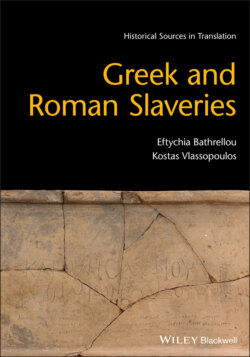Читать книгу Greek and Roman Slaveries - Eftychia Bathrellou - Страница 40
1.29 Xenophon, Memorabilia, 1.3.10–11: Greek Collection of Socratic Conversations (First Half of Fourth Century BCE)
ОглавлениеSocrates is commenting on the behavior of Kritoboulos, son of his friend Kriton of Alopeke.
Literature: Brock 2007; Vlassopoulos 2011a.
“You should now consider Kritoboulos a most reckless man, capable of anything; he would do a somersault into a ring of knives or jump into fire.”
“What did you see him do,” Xenophon said, “that makes you condemn him like that?”
“Didn’t he dare,” Socrates said, “to kiss Alcibiades’ son, who is extremely beautiful and exactly in the bloom of youth?”
“Well, if such is his reckless deed,” Xenophon said “I think that I too would endure this danger!”
“Wretched man,” Socrates said. “What do you think would happen to you if you kissed someone beautiful? Wouldn’t you immediately become slave, from free, and waste much in harmful pleasures and have no time to pursue beautiful and honorable things but be forced instead to concern yourself with things you wouldn’t care for even if mad?”
How is slavery understood in this passage?
Should we dismiss this use of slavery as metaphorical and, hence, historically insignificant?
